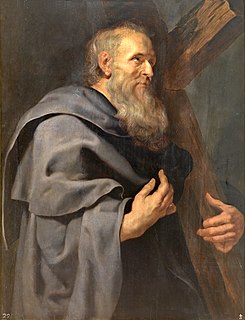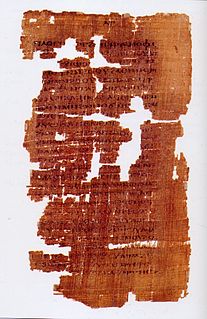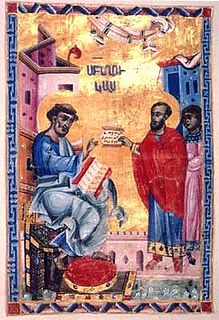Related Research Articles

Apocrypha are the biblical books received by the early Church as part of the Greek version of the Old Testament, but not included in the Hebrew Bible, being excluded by the non-Hellenistic Jews from their canon. Their position in Christian usage has been ambiguous.

Gospel originally meant the Christian message, but in the 2nd century it came to be used also for the books in which the message was set out; in this sense a gospel can be defined as a loose-knit, episodic narrative of the words and deeds of Jesus of Nazareth, culminating in his trial and death and concluding with various reports of his post-resurrection appearances.

The Old Testament is the first division of the Christian biblical canon, which is based primarily upon the 24 books of the Hebrew Bible or Tanakh, a collection of ancient religious Hebrew writings by the Israelites. The second division of Christian Bibles is the New Testament, written in the Koine Greek language.

Robert Grosseteste was an English statesman, scholastic philosopher, theologian, scientist and Bishop of Lincoln. He was born of humble parents in Suffolk, but the associations with the village of Stradbroke is a post-medieval tradition. Upon his death, he was almost universally revered as a saint in England, but attempts to procure a formal canonisation failed. A. C. Crombie called him "the real founder of the tradition of scientific thought in medieval Oxford, and in some ways, of the modern English intellectual tradition".

Saint Michael Choniates was a Byzantine writer and cleric, born at Chonae. At an early age he studied at Constantinople and was the pupil of Eustathius of Thessalonica. Around 1175 he was appointed archbishop of Athens, a position which he retained until 1204. In 1204, he defended the Acropolis of Athens from attack by Leo Sgouros, holding out until the arrival of the Crusaders in 1205, to whom he surrendered the city. After the establishment of Latin control, he retired to the island of Ceos. Around 1217 he moved again to the monastery of Vodonitsa near Thermopylae, where he died.

Philip the Apostle was one of the Twelve Apostles of Jesus according to the New Testament. Later Christian traditions describe Philip as the apostle who preached in Greece, Syria, and Phrygia.

Pseudepigrapha are falsely attributed works, texts whose claimed author is not the true author, or a work whose real author attributed it to a figure of the past.

The New Testament apocrypha are a number of writings by early Christians that give accounts of Jesus and his teachings, the nature of God, or the teachings of his apostles and of their lives. Some of these writings have been cited as scripture by early Christians, but since the fifth century a widespread consensus has emerged limiting the New Testament to the 27 books of the modern canon. Roman Catholic, Eastern Orthodox, and Protestant churches generally do not view these New Testament apocrypha as part of the Bible.

The Acts of Peter is one of the earliest of the apocryphal Acts of the Apostles. The majority of the text has survived only in the Latin translation of the Codex Vercellensis, under the title Actus Petri cum Simone. It is notable for a description of a miracle contest between Saint Peter and Simon Magus, and as the first record of the tradition that Saint Peter was crucified head-down.

The Acts of Paul and Thecla is an apocryphal story–Edgar J. Goodspeed called it a "religious romance"–of Paul the apostle's influence on a young virgin named Thecla. It is one of the writings of the New Testament apocrypha.

The Testaments of the Twelve Patriarchs is a constituent of the apocryphal scriptures connected with the Bible. It is believed to be a pseudepigraphical work comprising the dying commands of the twelve sons of Jacob. It is part of the Oskan Armenian Orthodox Bible of 1666. Fragments of similar writings were found at Qumran, but opinions are divided as to whether these are the same texts. It is generally considered apocalyptic literature.

Joseph and Aseneth is a narrative that dates from between 200 BCE and 200 CE. The first part of the story, an expansion of Genesis 41:45, describes the diffident relationship between Aseneth, the daughter of an Egyptian priest of Heliopolis and the Hebrew patriarch Joseph, the vision of Aseneth in which she is fed honeycomb by a heavenly being, her subsequent conversion to the God of Joseph, followed by romance, marriage, and the birth of Manasseh and Ephraim. The second part involves a plot by the Pharaoh's son, who recruits Dan and Gad to kill Joseph, only to be thwarted by Benjamin and Levi.
The Cave of Treasures, sometimes referred to simply as The Treasure, is an apocryphal and pseudoepigraphical work, that contains various narratives related to the Christian Bible. It was written in the Syriac language, approximately at the end of the 6th, or at the beginning of the 7th century. Its authorship was traditionally attributed to Ephrem of Edessa, but modern scholarly analyses have shown that the true author was some other person, who also lived in northern Mesopotamia, but much later.

Robert Henry Charles, was an Irish Anglican theologian, biblical scholar, professor, and translator from Northern Ireland. He is known particularly for his English translations of numerous apocryphal and pseudepigraphal Ancient Hebrew writings, including the Book of Jubilees (1895), the Apocalypse of Baruch (1896), the Ascension of Isaiah (1900), the Book of Enoch (1906), and the Testaments of the Twelve Patriarchs (1908), which have been widely used. He wrote the articles in the eleventh edition of Encyclopædia Britannica (1911) attributed to the initials "R. H. C."
Thomas Rennell (1787–1824) was an English theologian and author.

The Acts of the Apostles is a genre of Early Christian literature, recounting the lives and works of the apostles of Jesus. The Acts are important for many reasons, one of them being the concept of apostolic succession. They also provide insight into the valuation of "missionary activities among the exotic races," since some of them feature missionary work done among, for instance, the Cynocephaly.

The Jewish–Christian Gospels were gospels of a Jewish Christian character quoted by Clement of Alexandria, Origen, Eusebius, Epiphanius, Jerome and probably Didymus the Blind. Most modern scholars have concluded that there was one gospel in Aramaic/Hebrew and at least two in Greek, although a minority argue that there were only two, Aramaic/Hebrew and Greek.

In Christian theology and ecclesiology, apostles, particularly the Twelve Apostles, were the primary disciples of Jesus according to the New Testament. During the life and ministry of Jesus in the 1st century AD, the apostles were his closest followers and became the primary teachers of the gospel message of Jesus. There is also an Eastern Christian tradition derived from the Gospel of Luke of there having been as many as seventy apostles during the time of Jesus' ministry.

Saint Peter, also known as Simon Peter, Simeon, Simon, Cephas, or Peter the Apostle, was one of the Twelve Apostles of Jesus Christ, and one of the first leaders of the early Church.
References
Citations
- 1 2 3 Archer 1885.
Sources
| Wikisource has the text of the 1885–1900 Dictionary of National Biography's article about John Basing . |
-
 This article incorporates text from a publication now in the public domain: Archer, Thomas Andrew (1885). "Basing, John". In Stephen, Leslie (ed.). Dictionary of National Biography . 3. London: Smith, Elder & Co. p. 354–355.
This article incorporates text from a publication now in the public domain: Archer, Thomas Andrew (1885). "Basing, John". In Stephen, Leslie (ed.). Dictionary of National Biography . 3. London: Smith, Elder & Co. p. 354–355.